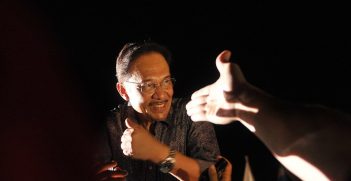Policy Priorities for South Korea's Next President

Following North Korea’s failed missile test, the usual set of suggestions for South Korean foreign policy will be trotted out: fix the relationship with China and strengthen relations with the US and Japan. But the looming presidential election is an opportunity to focus less on missile defence and more on modernising the nation’s policy machinery.
The next South Korean president must encourage innovation and change within the nation’s foreign policy machinery. It is a unique historical period during which both the policies and practices of diplomacy are being questioned. Policies that stood throughout the Cold War and beyond, including long-standing conventions on security alliances, trade and the movement of people, are in question. Practices that have stood since the transition from the ‘old’ to ‘new’ diplomacy at the end of World War I, including those relating to status, hierarchy, secrecy and sovereignty, are similarly being questioned.
Fear of failure
South Korea is in a particularly difficult position with a bureaucratic culture that emphasises seniority and stability over success and achievement. This has led to a conservative, risk-averse ministry unable to rapidly respond to change. A good example is the use of social media, such as Twitter and Facebook. Social media requires a willingness to give greater responsibility to officers outside the public affairs section, allowing them to take risks and accepting that mistakes will be made. Individual South Korean diplomats at post are not prolific users of Twitter or Facebook; diplomats are afraid of making mistakes and see social media as risky. The risk-averse nature of the ministry means South Korea is losing to competitors, such as the United Kingdom, Australia, the Netherlands and Sweden, which have not only accepted risk and mistakes, but have prepared strategic plans to deal with them.
Foreign ministries are notoriously conservative institutions but programs such as the Dutch appointment of the Advisory Committee on Modernising the Diplomatic Service, the US State Department’s appointment of a Representative to Silicon Valley or Australia’s own InnovationXchange program show that innovation and change is possible. Encouraging leadership, collaboration, openness and innovation are essential to a foreign ministry that must adapt to dynamic change in policy and practices.
Purple politics
The next South Korean president must also tackle the perception of presidential excess. Public frustration with what’s been labelled ‘imperial presidency’ is precisely why the next president is slated to occupy the presidential Blue House so soon. In South Korea, the president has always been dominant in foreign policy, with the influence of the National Assembly, the bureaucracy and ultimately the public severely limited. The Park administration reflected the trend present in many states, including Australia, towards greater executive control over foreign policy. But South Korea’s modern history and the association of former President Park Guen-hye with her father’s authoritarian rule meant that greater executive control over foreign policy was always going to be a challenge.
After coming to power, the Park administration reorganised the foreign policy bureaucracy, removing the trade portfolio from foreign affairs and placing it with industry and energy. While in South Korea it is the president’s prerogative to reorganise the bureaucracy, doing so without discussion, debate or even a detailed rationale seemed to signal what was to come. The negotiation of the 2015 ‘final and irreversible’ agreement on comfort women with Japan divided the public. The decision to deploy the Terminal High-Altitude Area Defense (THAAD) system in South Korea sealed public perceptions. The policies were not necessarily bad or poorly planned, but the lack of consultation appeared to many as evidence of an ‘imperial presidency’.
The perception of presidential foreign policy overreach could be mitigated by strengthening the National Assembly’s capacity to address foreign policy issues. Doing so would also encourage more informed debate rather than pointless politicking. Similarly, empowering the bureaucracy better to express opinions can reduce presidential excesses in policy: leaders need frank and fearless policy advice. Senior staff need to know that providing sometimes unwanted or unappreciated advice will not negatively affect their career. Encouraging foreign ministry career officers to express opinions and limiting political appointments will allow frank and fearless policy advice rather than encouragement or facilitation of executive dominance.
Reforming a broken system
Finally and perhaps most importantly, the next president must address constraints in foreign policy continuity. The ultimate aim should be to increase the powers of the National Assembly under the constitution and change the single-term five-year presidential term to a two-term four- or five-year presidential term.
Considering the time it takes to settle in, promote new policy, pass legislation and implement it, as well as the current uncertainty of the international environment, five years is not long enough to ensure the continuity of a policy initiative. Add the imbalance between executive and legislative influence, a weak party system and strong preferences for differentiation amongst political leaders, as well as the absence of bipartisanship on core issues, five years is impossible. But unfortunately, constitutional revision appears to be a long way off; no clear plans have been put forward and the public remains cautious.
The challenge of continuity in South Korea’s foreign policy is exemplified by the inability to sustain the momentum created in the creation of the Global Green Growth Institute (GGGI). The GGGI was established in August 2008 and transformed into a treaty-based intergovernmental organisation in October 2012. It positioned South Korea at the forefront of the movement to address a defining global issue and reflected classic middle power diplomacy. Despite its success, momentum did not carry through to the subsequent administration. Without reform to improve policy continuity, other initiatives such as MIKTA could see a similar dampening of enthusiasm. I have explored elsewhere options to address policy continuity without constitutional revisions.
The next South Korean president will have his or her hands full trying to balance China, the United States and Japan. The most important priority, however, should not be these three important partners but rather the nation’s own policymaking challenges.
Jeffrey Robertson is visiting fellow at the Asia-Pacific College of Diplomacy at the Australian National University (ANU) and assistant professor at Yonsei University in South Korea. He is author of Diplomatic Style and Foreign Policy: A Case Study of South Korea (Palgrave 2016). This piece is adapted from a longer essay published in the South Korea Economic Institute of America’s Academic Paper Series.
This article is published under a Creative Commons Licence and may be republished with attribution.





